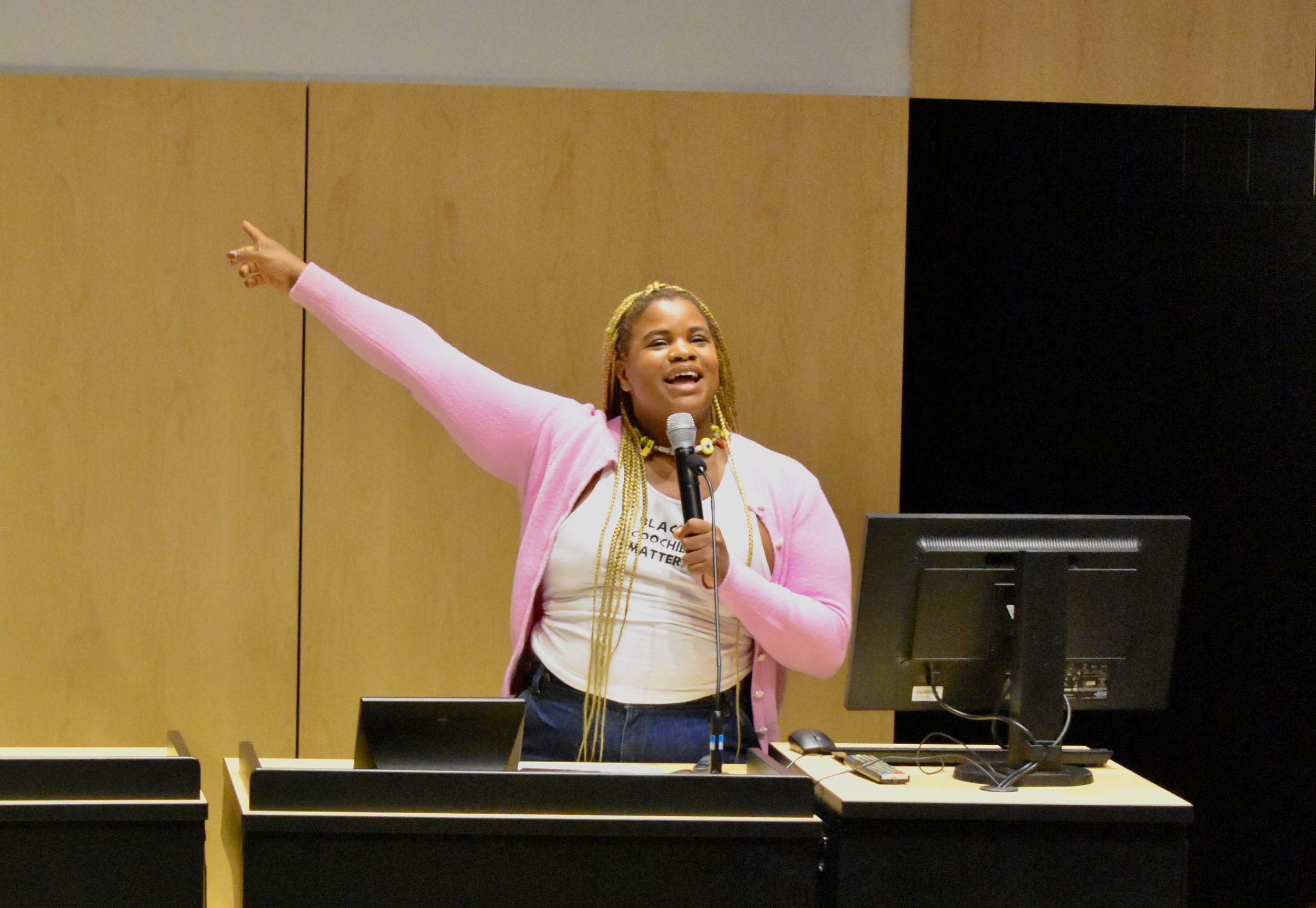Photo by Emma Quirk ‘26.
Erika Hart, above, addresses College community.
By Maahi Jaiswal ’24
Staff Writer
In honor of its annual Pronouns Day, the Office of Diversity, Equity and Inclusion hosted a keynote event that featured sexuality educator Ericka Hart on Wednesday, Oct. 18.
Ericka Hart is a queer, Black femme activist who received their master’s of education in human sexuality from Widener University. Afterward, they served as a sexuality educator, spending time in the Peace Corps as an HIV/AIDS volunteer based in Ethiopia. Hart has been engaging with youth as well as adults in New York for over 10 years.
A breast cancer survivor, Hart has strived to share their personal journey on social media platforms to represent Black and Brown LGBTQ+ voices on breast cancer awareness. Their work includes analysis of the empowerment of marginalized communities and is dedicated to combating anti-Blackness. They also work to expose how the medical industrial complex’s systems of care can contribute to “the perpetuation of illness in marginalized communities,” according to Hart’s personal website.
The event was held in Gamble Auditorium with past and current members of the Office of DEI in attendance. Audience members could join through a live stream or attend in person.
The keynote began with a bold contemplative exercise that challenged students to step out of their comfort zones. The exercise instructed attendees to find someone next to them and simply look at each other for five minutes in silence.
“I want you to consider — what did this person that you’re looking at eat for breakfast? … Did they have access to food? How about lunch?” Hart asked.
Hart emphasized resisting the urge to speak or look away, as they wanted people to simply connect and think about the person they were looking at. “Just be with the person you are looking at. … What’s their life like?” Hart said.
Continuing with more prompts, this activity shed light on how, despite existing in the same community, people often do not acknowledge each other.
“You’re the Mount Holyoke community. … So, how do you become a community if you don’t ever connect with somebody?” Hart stated.
Hart continued by speaking on food justice and the collective responsibility people share for their community’s health and safety, something they must take on through action, connection and effort. Hart named specific group norms and engaged with students in the audience. Students shared their experiences with intellectual humility, social positionality and social justice growth.
Thereafter, Hart showed a map of Connecticut, Massachusetts and Rhode Island that depicted state borders alongside the locations of original Indigenous tribes to exemplify the history of settler colonization in the United States.
Jasmine Greene ’25 spoke about the importance of such maps, stating that “it allows us to acknowledge that we are in parts of Indigenous lands. And this is important because we have to acknowledge that we weren’t here first … we are actively taking up space.”
Hart related this back to Mount Holyoke College’s land acknowledgment and the lack of action on the part of the College. “I searched and searched for action on [the] Mount Holyoke website. I did not see any level of action. … We have to consider that oftentimes our land acknowledgments are insufficient,” said Hart.
They followed up this statement by displaying a map of Boston, showcasing the redlining of the community and the housing discrimination present — issues they first learned about in their hometown of Baltimore.
“Black folks especially were not given the ability to borrow money ... to pay for mortgages, which led to de facto segregation in a lot of metropolitan areas. There exists now a class difference that is racially based due to unfair lending practices that have persisted and continue to persist,” Hart added.
This topic served as a segue into a discussion of capitalism and the cost of living. Hart urged the audience to ponder: “Why is there a cost of living?”
Their focus was on how fatphobia is interwoven in many academic settings and how there was no conversation about sex and sexuality for them as a breast cancer survivor. Community care had become inaccessible to them, and as a result, Hart was forced to go back to work full-time while undergoing chemotherapy.
Throughout their career of leading workshops and keynotes, Hart has emphasized that “sex positivity is decolonizing.” As a concluding activity, Hart presented a final slide of remarks and urged students to read aloud what they hoped to take away from the lecture. Everyone chanted together, proclaiming, “Sex positivity is actively anti-racist, anti-imperialism, is a safe and affordable place to sleep every night, is reproductive justice and is accessible for all bodies, abilities and ages,” in unison.

